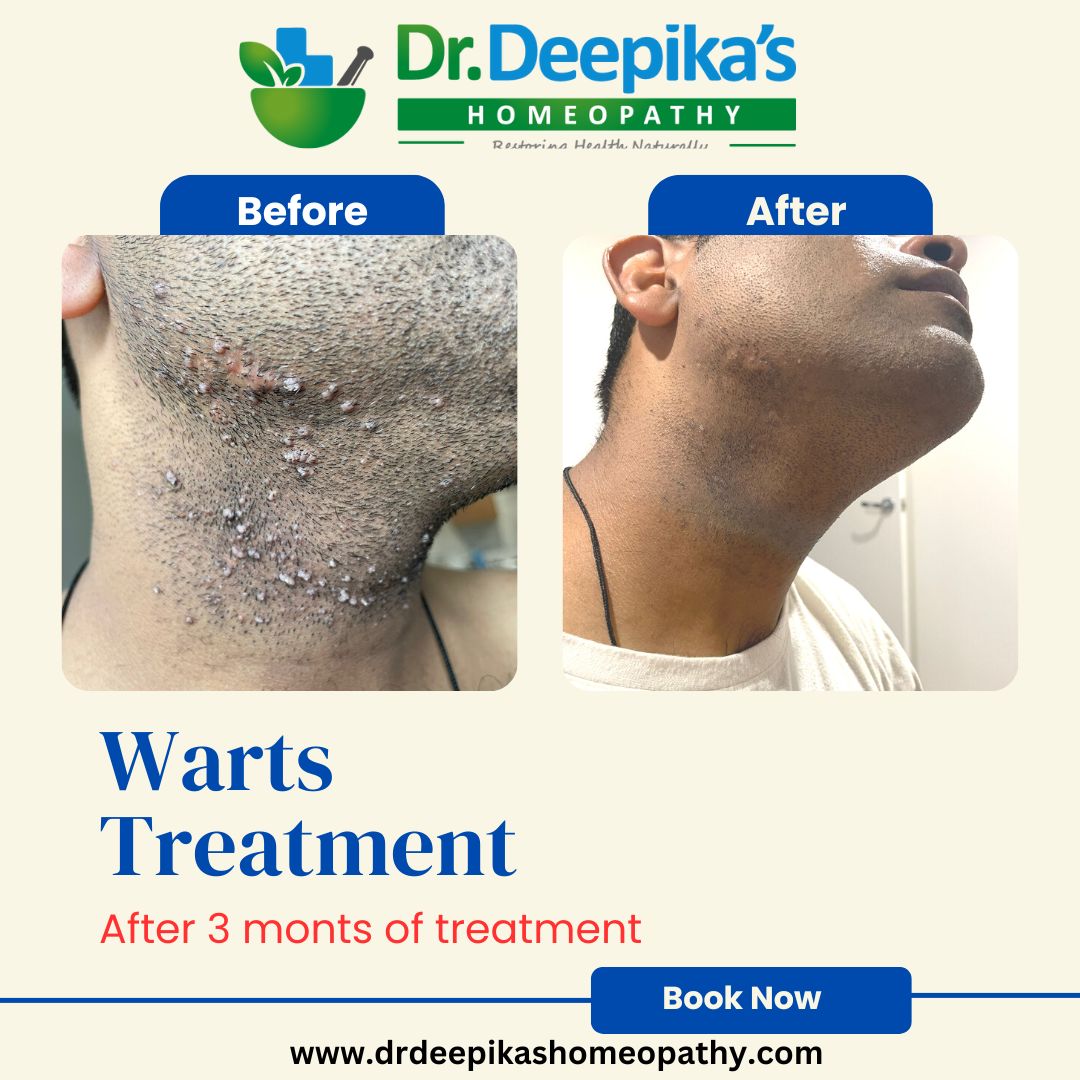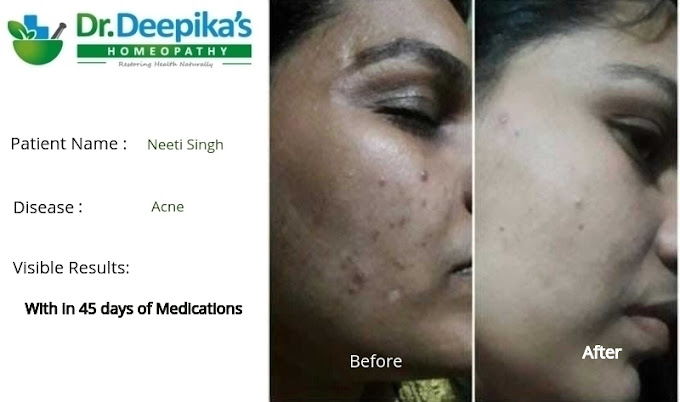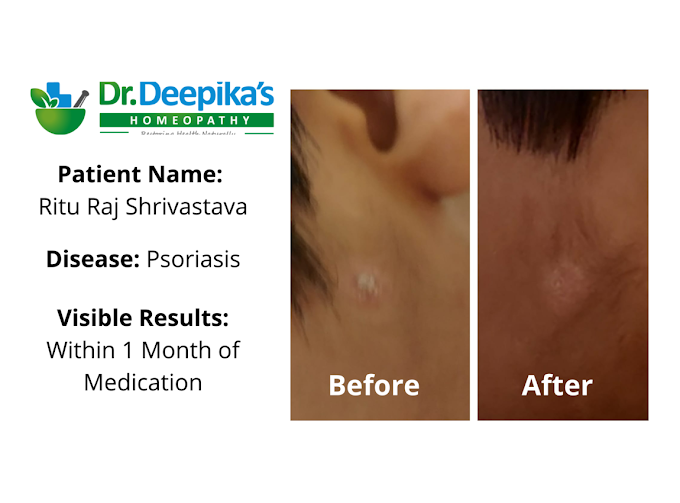Vitiligo Treatment at Dr. Deepika's Homeopathy: Restoring Skin Pigmentation Naturally
Vitiligo Treatment Overview:
Vitiligo is a chronic skin disorder characterized by the loss of pigment-producing cells, resulting in white patches on the skin. Dr. Deepika’s Homeopathy offers a reliable and natural approach to vitiligo treatment, focusing on restoring skin pigmentation, preventing further progression, and enhancing overall well-being.
Facts About Vitiligo:
Prevalence: Vitiligo affects approximately 1-2% of the global population, regardless of age, gender, or ethnicity.
Autoimmune Condition: Vitiligo is believed to be an autoimmune disorder in which the body’s immune system mistakenly attacks and destroys the melanocytes, the cells responsible for producing skin pigment.
Vitiligo is a skin disorder characterized by the loss of skin pigment, resulting in white patches on the skin. Dr. Deepika’s Homeopathy offers a reliable and natural approach to vitiligo treatment, focusing on restoring skin pigmentation, preventing further progression, and enhancing overall well-being. With personalized homeopathic remedies and comprehensive care, patients with vitiligo can experience improved repigmentation, reduced depigmentation, and enhanced self-confidence. Dr. Deepika’s expertise in homeopathy ensures that the treatment plan is tailored to each patient’s unique needs, promoting skin health and improving their overall quality of life.
Disclaimer:
The information provided here is for educational purposes only and should not be considered medical advice. Treatment for vitiligo should be sought under the guidance and supervision of a qualified dermatologist or healthcare professional specializing in skin conditions. Individual responses to treatment may vary, and it is important to consult with a healthcare provider for proper diagnosis, evaluation, and personalized treatment options tailored to your specific skin health needs and circumstances.
Types of Vitiligo:
Vitiligo is a skin condition characterized by the loss of pigment, resulting in white patches on the skin. There are different types of vitiligo based on the distribution and pattern of these patches. Here are the common types of vitiligo:
Non-Segmental Vitiligo (NSV):
- Symmetrical Distribution: In NSV, the white patches appear symmetrically on both sides of the body. This type is further categorized into:
- Generalized Vitiligo: White patches appear widely across the body, including the face, trunk, extremities, and genital areas.
- Universal Vitiligo: This is the most extensive form, where nearly all of the body’s skin becomes depigmented, resulting in widespread white patches.
- Symmetrical Distribution: In NSV, the white patches appear symmetrically on both sides of the body. This type is further categorized into:
Segmental Vitiligo (SV):
- Localized Distribution: SV is characterized by white patches that occur on one side or segment of the body, such as one limb or one side of the face. This type often appears at a younger age and may progress differently than NSV.
Mixed Vitiligo:
- Combination of NSV and SV: Some individuals may have a combination of both NSV and SV, with white patches occurring both symmetrically and in localized segments.
Acrofacial Vitiligo:
- Involving Extremities and Face: Acrofacial vitiligo specifically affects the fingers, toes, hands, feet, and face. The depigmentation is concentrated in these areas, often affecting the fingertips, knuckles, and around the eyes and mouth.
Mucosal Vitiligo:
- Involving Mucous Membranes: Mucosal vitiligo affects the mucous membranes, such as the lips, inside the mouth (oral mucosa), and genital areas. This type may occur independently or alongside skin depigmentation.
Focal Vitiligo:
- Localized Depigmentation: Focal vitiligo involves small, isolated white patches that may occur anywhere on the body. These patches are typically limited in size and number.
Trichrome Vitiligo:
- Tri-Color Appearance: Trichrome vitiligo is characterized by the presence of three colors in the affected areas – depigmented white patches, normally pigmented skin, and a border of hyperpigmentation (darkened skin).
Symptoms of Vitiligo:
Vitiligo is characterized by the development of white patches on the skin due to the loss of pigment-producing cells (melanocytes). The primary symptom of vitiligo is the presence of these depigmented patches, which can vary in size, shape, and location. Here are the common symptoms associated with vitiligo:
White Patches: The hallmark symptom of vitiligo is the appearance of white or depigmented patches on the skin. These patches may start as small areas and gradually expand over time. The edges of the patches may be well-defined or irregular.
Symmetrical Distribution: In many cases, vitiligo patches appear symmetrically on both sides of the body. For example, if a patch develops on one elbow, a similar patch may appear on the other elbow.
Localized or Generalized: Vitiligo can occur in localized areas, affecting specific body parts such as the face, hands, feet, elbows, knees, or genital areas. Alternatively, it can be generalized, with patches appearing widely across multiple areas of the body.
Variation in Color: While the patches are typically lighter than the surrounding skin due to depigmentation, they may vary in color from pure white to light pink or slightly darker shades.
Border Changes: The edges of vitiligo patches may be smooth or irregular. Some patches may have a distinct border, while others may blend gradually into the surrounding skin.
Hair and Eye Involvement: In addition to skin depigmentation, vitiligo can affect hair color. Hair in the affected areas, such as the scalp, eyebrows, eyelashes, and beard, may turn white or lose pigment. Similarly, the color of the iris in the eyes may change, resulting in heterochromia (different colored eyes).
Sensitivity to Sunlight: Areas of depigmented skin in vitiligo may be more sensitive to sunlight (photosensitivity). Sun exposure can cause sunburns or tanning of the surrounding normal skin, making the contrast with vitiligo patches more noticeable.
Emotional Impact: Although not a physical symptom, vitiligo can have emotional and psychological effects on individuals, leading to feelings of self-consciousness, low self-esteem, and social anxiety due to changes in appearance.
Diagnosis of Vitiligo:
Diagnosing vitiligo involves a comprehensive evaluation to assess symptoms, medical history, and physical examination. Dr. Deepika follows a meticulous approach that may include:
Medical History Assessment: A detailed discussion about the patient’s symptoms, family history, and medical history helps in understanding the duration and progression of the condition.
Physical Examination: Dr. Deepika may perform a physical examination to assess the extent and distribution of the white patches on the skin.
Wood’s Lamp Examination: This special lamp uses ultraviolet light to highlight areas of depigmentation and aid in the diagnosis of vitiligo
Homeopathic Treatment for Vitiligo:
Dr. Deepika’s Homeopathy offers a natural and holistic approach to vitiligo treatment. Homeopathic remedies, derived from natural sources, are safe, gentle, and non-toxic. The treatment focuses on stimulating the body’s innate healing mechanisms, restoring pigment production, and improving overall well-being. The homeopathic treatment may include:
Individualized Assessment: Dr. Deepika conducts a detailed assessment, considering the patient’s medical history, specific symptoms, and the unique characteristics of their vitiligo. This helps in tailoring the treatment approach accordingly.
Customized Remedies: Based on the assessment, Dr. Deepika prescribes personalized homeopathic remedies that match the individual’s symptoms and address the underlying causes of vitiligo. These remedies aim to stimulate melanocyte activity, promote repigmentation, and restore skin color.
Holistic Care: Homeopathy considers the overall well-being of the patient. Dr. Deepika may provide guidance on stress management, lifestyle modifications, and dietary adjustments that can support the healing process and improve overall health.
External Applications: In addition to internal remedies, Dr. Deepika may recommend external applications, such as ointments or creams, containing homeopathic ingredients to facilitate repigmentation.
Follow-up and Monitoring: Regular follow-up consultations are conducted to monitor the progress ofthe treatment, assess the effectiveness of the homeopathic remedies, and make any necessary adjustments to the remedy prescription. Dr. Deepika’s expertise ensures that the treatment plan is tailored to each patient’s specific needs.



EXCELLENTTrustindex verifies that the original source of the review is Google. GoodPosted onTrustindex verifies that the original source of the review is Google. Docters are very kind and help full Providing the best results and cure Really happy to share thi reviewPosted onTrustindex verifies that the original source of the review is Google. I approached her for my sinus treatment which I am having for years and she cured 90% of it in just 3 sittings and her approach is something I haven't seen with any of the doctor I met before, she is really good.Thank you so much doctorPosted onTrustindex verifies that the original source of the review is Google. She is best homeopathic doctor at sector 62, I was suffering from chickenpox , smallpox issue.. I got relieved from her medicine in 7 days.. Thanks doctorPosted onTrustindex verifies that the original source of the review is Google. What a miracle!! I contact Dr. Deepika's homeopathy for the treatment of external hemorrhoids. Result was unbelievable, withing 7 days it cured. Thanks for wonderful service.Posted onTrustindex verifies that the original source of the review is Google. Dr deepika Best doctor for kidney stone in noida.. You will get garateed relief within 30 to 45 days of medicine.. I got relief within 1 -2 doses only.







